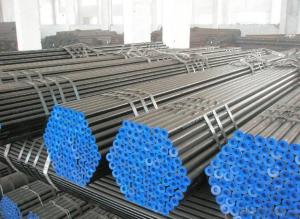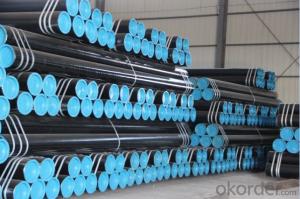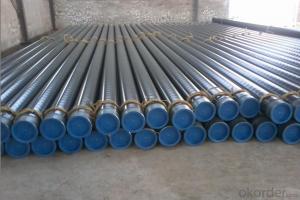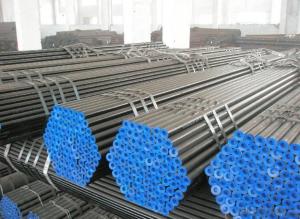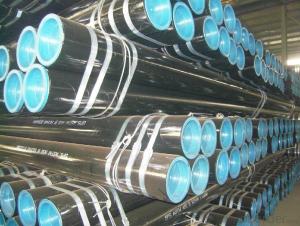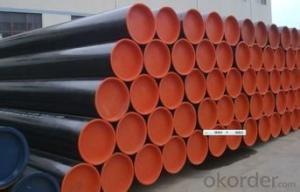Seamless steel tube API,GB,ASTM,ASME,DIN
- Loading Port:
- Tianjin
- Payment Terms:
- TT OR LC
- Min Order Qty:
- 10 m.t.
- Supply Capability:
- 5000 m.t./month
OKorder Service Pledge
OKorder Financial Service
You Might Also Like
1. Commodity Name: Seamless steel pipe
2. Standard: API,GB,ASTM,ASME,DIN
3. Quality grade: 10#, 20#, A106B, A53B, API 5L B, Q235, Q345, ST37-2, ST 45, ST52.etc.
4. Dimension:
OD: 1/2"-24"
WT: 2.5-80mm, SCH10~SCH40~XXL
length: 5.8m,6m,8m,9m,12m
5. Technique: Hot Rolled/Cold Rolled/ Cold Drawn
6. application
carbon seamless steel pipes are widely used in gas, water and oil, transpotation;constructions;Bridge,highway,windows of model steel door; building materials;fences;heating facilities Fluid Pipe;conduit pipe,scaffolding pipe.etc.
7. Payment Terms: L/C D/A D/P T/T
8.packing and shipment
Packaged in bundles,as per customers' requirements, it can also bepackagesd as beveled ends, typed marking, black painting, plastic caps protection,woven bags packing
For 20" container the max length is 5.8m; For 40" container the max length is 12m. other options are available based on customer requests. Please discuss when placing orders.
9. Surface: painted with varnish;
10. Plastic caps at ends.
11. Tolerance: OD +1%/-1%
WT +12.5%/-10%
12. Chemical composition:
Models of Steel Pipes | Chemical Component | |||||||
Steel 20 (ASTM A106B) | C | Si | Mn | P | S | Cu | Ni | Cr |
0.17~0.24 | 0.17~0.37 | 0.35~0.65 | 0.035max | 0.035max | 0.25max | 0.25max | 0.25max | |
Steel45 (ASTM 1045) | 0.42~0.50 | 0.17~0.37 | 0.50~0.80 | 0.035max | 0.035max | 0.25max | 0.25max | 0.25max |
16Mn(Q345B) | 0.12~0.20 | 0.20~0.55 | 1.20~1.60 | 0.035max | 0.035max | 0.25max | 0.25max | 0.25max |
45Mn2 ( ASTM1345) | 0.42~0.49 | 0.17~0.37 | 1.40~1.80 | 0.035max | 0.035max | 0.3max | 0.3max | 0.30max |
- Q: Are steel tubes and round steel in weight or length when purchased?
- The price must be measured by weight, and the length, volume and other specifications should be entered
- Q: What is the cost of steel pipes compared to other pipe materials?
- The cost of steel pipes is typically higher compared to other pipe materials such as PVC or copper.
- Q: What are the different types of steel pipe caps?
- There are several different types of steel pipe caps, including threaded caps, socket weld caps, butt weld caps, and flanged caps.
- Q: What are the different methods of pipe threading for steel pipes?
- There are three main methods of pipe threading for steel pipes: manual threading, machine threading, and roll grooving. Manual threading involves using a handheld threader to create threads on the pipe. Machine threading is done using a power-driven threading machine that automates the threading process. Roll grooving is another method where grooves are formed on the pipe by using a specialized machine, which allows for the connection of pipes using mechanical couplings. Each method has its advantages and is chosen based on the specific requirements and preferences of the project.
- Q: What are the different end finishes for steel pipes?
- There are several different end finishes for steel pipes, depending on their intended use and the specific requirements of the application. Some of the most common end finishes for steel pipes include: 1. Plain End: This is the simplest and most common type of end finish, where the pipe is cut square at both ends without any additional treatment or threading. Plain end pipes are typically used for low-pressure applications or when the pipe will be connected using welding methods. 2. Beveled End: A beveled end finish involves cutting the pipe at an angle, usually 30 or 37.5 degrees, to facilitate easier welding and create a stronger joint. Beveled end pipes are commonly used for butt-welding applications, where two pipes are joined together by aligning the beveled ends and welding them. 3. Threaded End: In this end finish, the pipe is threaded at both ends to allow for easy connection with threaded fittings or couplings. Threaded end pipes are commonly used in plumbing and gas distribution systems, as well as for applications that require frequent disassembly and reassembly. 4. Coupled End: Coupled end finishes involve the installation of couplings or connectors at each end of the pipe. This allows for quick and easy connection of pipes without the need for additional threading or welding. Coupled end pipes are often used in oil and gas pipelines or in applications where rapid installation is required. 5. Grooved End: A grooved end finish involves cutting grooves into the pipe's ends and using mechanical couplings or fittings to join the pipes together. This type of end finish is commonly used in fire protection systems, as well as for large-diameter pipes that require quick and efficient assembly. 6. Flanged End: Flanged end finishes involve attaching flanges to the pipe ends, which can be bolted together to create a secure and leak-proof connection. Flanged end pipes are commonly used in applications that require easy disassembly and reassembly, such as in chemical plants or refineries. It is important to note that the choice of end finish for a steel pipe depends on factors such as the application, the required joint strength, the type of connection method, and the compatibility with other system components. Consulting with a professional or referring to industry standards is recommended to ensure the correct end finish is selected for a specific application.
- Q: What is the compressive strength of steel pipes?
- The compressive strength of steel pipes can vary depending on the specific grade and manufacturing process, but it is generally high. On average, steel pipes have a compressive strength ranging from 60,000 to 120,000 pounds per square inch (psi).
- Q: What does the diameter of a steel pipe project mean?
- Generally, the diameter of steel pipe has three common diameters: outer diameter, inner diameter and nominal diameter.The first two are well understood.Nominal diameter refers to the national standard to specify the general diameter of a certain national standard pipe. It is only a model representation. It is neither outer diameter nor inner diameter.
- Q: How are steel pipes used in the telecommunications sector?
- Steel pipes are commonly used in the telecommunications sector for various purposes. Firstly, steel pipes are used as conduit for underground cable installations. These pipes provide protection and support to the fiber optic cables that carry data and voice signals across long distances. The sturdy nature of steel pipes ensures that the cables remain safe from external factors such as moisture, rodents, and accidental damage. Additionally, steel pipes are used in the construction of telecommunication towers and masts. These structures require a strong and durable material to support the weight of antennas, transmitters, and other equipment. Steel pipes, with their high tensile strength and resistance to harsh weather conditions, are ideal for this purpose. Moreover, steel pipes are used for the installation of overhead communication lines. These lines are often suspended between poles or towers, and steel pipes are used as supports or brackets to hold the cables in place. The corrosion-resistant properties of steel make it a reliable choice for outdoor installations that are exposed to the elements. In summary, steel pipes play a crucial role in the telecommunications sector by providing protection, support, and durability to cable installations, tower constructions, and overhead communication lines. Their strength and resistance to environmental factors make them an essential component in building and maintaining reliable telecommunications networks.
- Q: Are steel pipes suitable for chemical processing plants?
- Due to their exceptional strength, durability, and corrosion resistance, steel pipes find common usage in chemical processing plants. Particularly, stainless steel or alloy steel pipes possess the ability to endure high temperatures, pressure, and the corrosive impact of various chemicals. Consequently, they serve as a suitable means for the safe and efficient transportation and containment of diverse chemical substances. Moreover, the installation, maintenance, and repair of steel pipes are hassle-free, rendering them a cost-effective option for chemical processing plants. Nonetheless, it remains crucial to carefully select the appropriate steel type, taking into account factors such as the specific chemicals being processed, operating conditions, and any potential risks or compatibility issues. Regular inspections and maintenance are also vital for ensuring the integrity and performance of steel pipes in chemical processing plants.
- Q: How do steel pipes compare to other pipe materials like PVC or copper?
- Steel pipes have distinct advantages over other pipe materials like PVC or copper. Firstly, steel pipes are extremely durable and can withstand high pressure and temperature, making them suitable for various industrial applications. They also have a longer lifespan compared to PVC or copper pipes, reducing the need for frequent replacements. Moreover, steel pipes are highly resistant to corrosion and chemical reactions, ensuring a consistent flow of water or other substances. However, steel pipes are generally more expensive and require skilled labor for installation. PVC pipes, on the other hand, are lightweight, cost-effective, and easier to install, but they may not be as durable or resistant to extreme conditions. Copper pipes are known for their excellent heat conductivity and resistance to fire, but they are more expensive and require more maintenance. Ultimately, the choice between steel, PVC, or copper pipes depends on the specific requirements of the project and the factors of cost, durability, and functionality.
Send your message to us
Seamless steel tube API,GB,ASTM,ASME,DIN
- Loading Port:
- Tianjin
- Payment Terms:
- TT OR LC
- Min Order Qty:
- 10 m.t.
- Supply Capability:
- 5000 m.t./month
OKorder Service Pledge
OKorder Financial Service
Similar products
Hot products
Hot Searches
Related keywords










